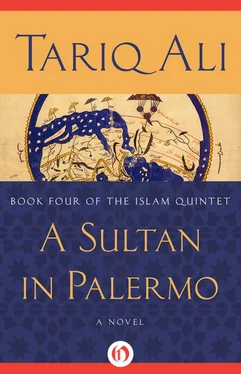Despite himself, Idrisi had begun to fall under the preacher’s spell. At times his superstitious beliefs irritated him, but the fierceness and fervour with which he spoke against the land-grabbing Church and the mercenaries it employed as its hangmen were admirable. And the multitudes he aroused were far from credulous. They knew he spoke the truth and they compared him to their Amirs and landowners who vied with each other to appease and please their enemies, especially the monks, who were constantly preaching sermons advocating terror and violence to rid the island of Believers and Jews.
From where did this religious passion come? It was a response to the fires that had been lit to destroy what he had long regarded as indestructible. The early victories of the Prophet and the resulting triumphs had created a civilisation so proud and conscious of its superiority that, like the ancients of Greece and Rome, it became infected with the idea that this superiority made it invulnerable. A fatal error.
But the Trusted One had been right to draw attention to the treachery that had led to the invitation despatched by Ibn Thumna, the Amir of Siracusa, to the Franks. Events that had taken place a hundred years ago were still fresh in the imagination of most Believers. How many times had Idrisi heard the story of the evil and promiscuous Amir, Ibn Thumna, who had killed the pious and noble Ibn Maklati, the Amir of Catania, for reasons of sheer greed. He wanted more land. The murder was avenged by Ibn al-Hawwas, who inflicted a crushing defeat on the Siracusan Amir. It was then and simply to save his own skin that Ibn Thumna had invited the infidels to cross the water. He was killed in battle alongside them, so gained nothing in the end. He was probably roasting in the fires of hell at this very moment. It suited Idrisi to think of somewhere hotter than Siqilliya.
He looked up at the sky. Not a cloud in sight, even though the shepherds had predicted rain last night. Sweat poured down his face and neck and he yearned for a moist sea breeze as they galloped on. He would not rest till the men pleaded on behalf of their horses. Coming to a grove of trees, the trunks and boughs twisted by the wind and wounded by lightning and the leaves parched and withered, he relented. As he strolled among the trees he could hear the men talk of the Trusted One. When he joined them they fell silent, but he asked if they had attended the mehfil at the village. They nodded without volunteering any information.
‘Would all of you join the army of which the Trusted One spoke?’
Again they nodded.
‘You are prepared to die, but for what?’
‘So that the prayers can be said in the name of the Caliph once again.’
‘Is that all?’
Another voice replied. ‘Many of our people work as slaves for the Church. When we defeat the infidels we can free all our people.’
Then the youngest of them, who had not spoken, said, ‘We are poor people and you are a great scholar. How can we tell you anything you don’t already know. But you can teach us a great deal. Do you think we can win?’
Idrisi thought before replying. ‘I don’t know. There is a tendency amongst our people to boast loudly of our capacities. We became too selfish and vainglorious. If extravagant language could defeat the enemy, we would never lose a single battle. And then there is this island, which has a magical effect on all who come here, regardless of their faith. Geography and local conditions isolate us from other lands and, Nazarene or Believer, we begin to adjust to the conditions here. The geography of this island shapes our character and in fifty years or more — Believer or Jew or Nazarene — you will not be able to tell the difference between us. We become Siqilliyani facing the same problems.’
The men did not know what to make of this, and smiled but remained silent. Ready to move on again, they covered their heads and mounted their horses.
A gentle wind arose and clouds had already darkened the sky as they reached Siracusa.
Idrisi was greeted by the palace steward, who informed him that the Amir was expected back later that night. A bath had been prepared for him and the Lady Balkis would join him for the evening meal.
‘Are the Lady Mayya and Elinore here?’
‘They returned to Palermo a few days ago.’
He had been hoping to find his daughter on her own and take her back with him. Why had Mayya gone back so soon? Balkis would have the answers.
He went to the hammam where a warm aromatic bath had been prepared for him. Camomile, wild thyme, marjoram and yes, mountain-mint. Was that a bundle of black nightshade he saw floating in the water? It was. He lifted it out of the bath and handed it to the attendant.
‘Who chose the herbs?’
‘The Lady Balkis.’
He made a mental note to tell his sister-in-law that nightshade should only be used to cure insomnia. As he slipped into the bath he felt the soothing powers of the herbs extracting the tiredness out of him. He lay back and enjoyed an infusion that was poured on his head, after which the attendant massaged it for what appeared to be a very long time. He insisted on a cold bath to get rid of the slight drowsiness and soon emerged feeling completely refreshed.
A different bedchamber had been prepared for him, but since the view of the sea was even better, he did not complain. It was raining and the sea was rough. He could see the boats along the quay bobbing up and down like a row of horses before a race. An attendant knocked on the door to tell him that the meal was about to be served. He followed her to a set of rooms where he found Balkis awaiting him, dressed in a gaudy red tunic, her golden curls tied in a knot. The colour did not suit her.
‘Welcome back, Muhammad ibn Muhammad. I am only sorry my husband is not here to greet you. As you can see, the weather is really bad and I think he will not arrive till tomorrow. The messenger who brought the news said that the Amir insisted you not leave for Palermo without seeing him.’
Idrisi bowed politely. ‘I’m touched by your hospitality. If the storm carries on like this I doubt I will be able to leave in the morning. I will wait till the Amir returns. I, too, have things I wish to discuss with him.’
‘I’m sorry to hear of your daughter’s death. Were you close to her?’
‘No and that makes me feel guilty. But let us not talk about sad things this evening. I was looking forward to seeing Mayya and Elinore. Why did you let them depart?’
‘It was Elinore who insisted.’
For a while they ate in silence.
‘Balkis, I have been wondering. You and Mayya don’t look like sisters. Did you have different mothers?’
Balkis smiled and said as if it were the most normal thing in the world, ‘No. Different fathers.’
‘I’m sorry. I did not mean to pry.’
‘Should I tell you the whole story?’
‘Please do.’
While he was listening, a serving woman cleared the table, and another placed little bowls of herb infusions in front of them. So enraptured by Balkis was Idrisi that he sipped his without noticing the shahdanaj al-barr* and honey. Its effects were not immediate, but even as he listened he felt a light-headedness emboldening him in the way he looked at her.
Abruptly he asked, ‘Why did you decide to wear this unbearable red dress? The colour does not suit your complexion. Was it deliberate?’
‘What would you like me to do?’
‘Take it off and…’
Her laughter interrupted him. He was relieved it was not a stupid or a malicious laugh, but delicate and careful without being precious. There was no movement of the hand to conceal her lips, a gesture he disliked in women.
He returned to her story. ‘Did Mayya know?’
Читать дальше












